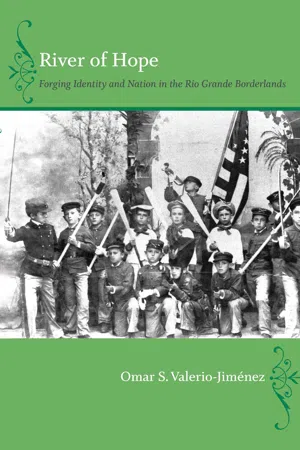
River of Hope
Forging Identity and Nation in the Rio Grande Borderlands
- English
- PDF
- Available on iOS & Android
River of Hope
Forging Identity and Nation in the Rio Grande Borderlands
About this book
Diverse influences transformed the borderlands as Spain, Mexico, and the United States competed for control of the region. Indian slaves joined Spanish society; Mexicans allied with Indians to defend river communities; Anglo Americans and Mexicans intermarried and collaborated; and women sued to confront spousal abuse and to secure divorces. Drawn into multiple conflicts along the border, Mexican nationals and Mexican Texans (tejanos) took advantage of their transnational social relations and ambiguous citizenship to escape criminal prosecution, secure political refuge, and obtain economic opportunities. To confront the racialization of their cultural practices and their increasing criminalization, tejanos claimed citizenship rights within the United States and, in the process, created a new identity.
Published in cooperation with the William P. Clements Center for Southwest Studies, Southern Methodist University.
Frequently asked questions
- Essential is ideal for learners and professionals who enjoy exploring a wide range of subjects. Access the Essential Library with 800,000+ trusted titles and best-sellers across business, personal growth, and the humanities. Includes unlimited reading time and Standard Read Aloud voice.
- Complete: Perfect for advanced learners and researchers needing full, unrestricted access. Unlock 1.4M+ books across hundreds of subjects, including academic and specialized titles. The Complete Plan also includes advanced features like Premium Read Aloud and Research Assistant.
Please note we cannot support devices running on iOS 13 and Android 7 or earlier. Learn more about using the app.
Information
Table of contents
- Contents
- List of Maps, Figures, and Tables
- Acknowledgments
- Introduction
- Chapter 1. Constructing Vecinos, Constructing Indios: Complex Interdependence
- Chapter 2. Fragmented Communities: Class and Gender Hierarchies
- Chapter 3. Opposing Forces: Political Loyalty and Trade
- Chapter 4. Bandidos or Citizens? : Everyday Forms of Resistance to Political and Legal Changes
- Chapter 5. Divorcées, Rancheros, and Peons: Changing Class and Gender Relations
- Chapter 6. Contested Citizenship: The Enduring Roles of Race and Class
- Conclusion
- Notes
- Bibliography
- Index